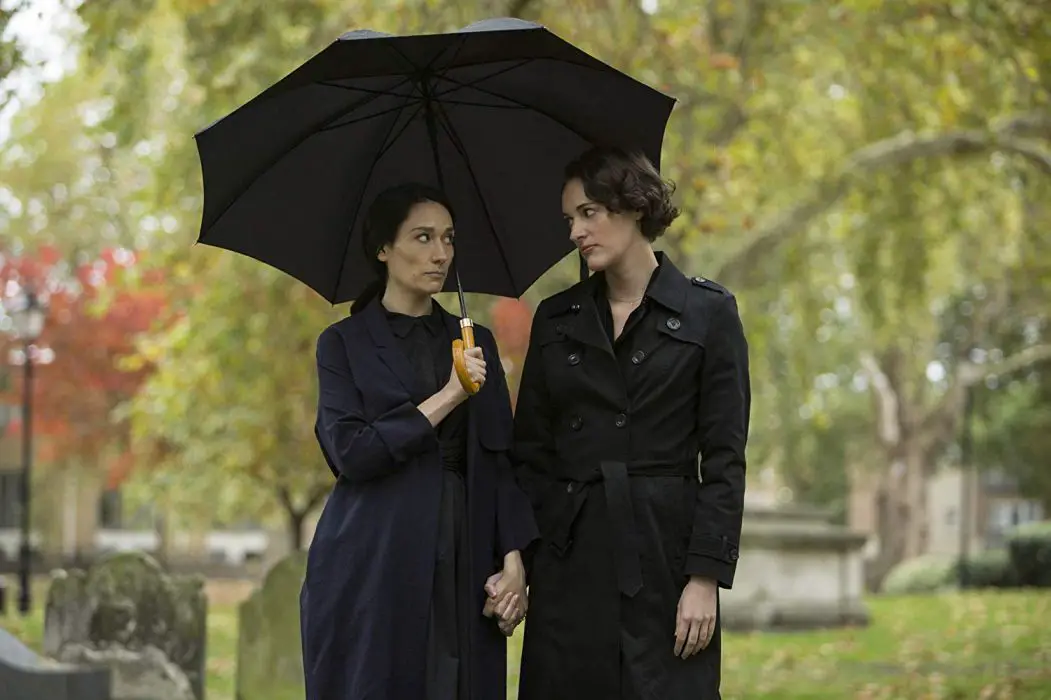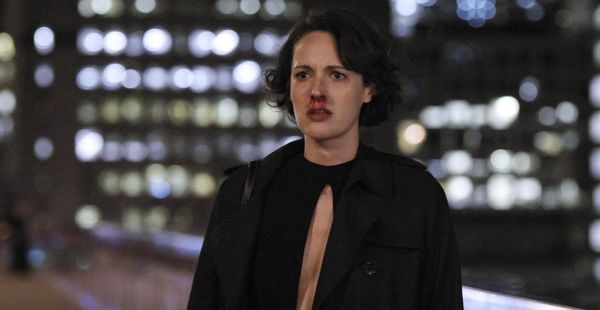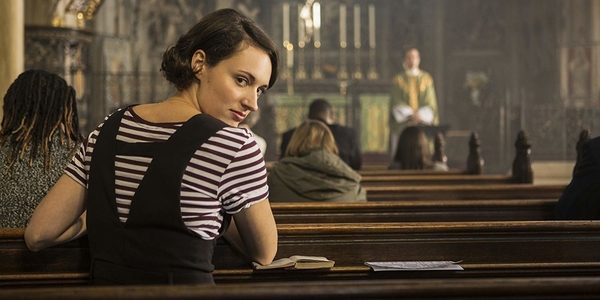Why We Love FLEABAG: Phoebe Waller-Bridge’s Sardonic Exploration Of Difficult Women

Monique Vigneault is a Mexican-Canadian film critic. She regularly covers…
On May 17, Phoebe Waller-Bridge’s sarcastic anti-hero, Fleabag returns to the screen one last time, only now she isn’t challenging her family: she’s challenging god himself. In this darkly quick-witted, yet touching six-episode conclusion to the series, Waller-Bridge aims her red pen at the church, with a dash of blasphemy—a lot of blasphemy. We return to our protagonist, a 30-something Londoner, played by Waller-Bridge herself, as she confronts her nihilism while desperately straining to mend her broken life together.
Waller-Bridge’s writing in the first installment of the series was an exploration of the protagonist’s chaotic unraveling of grief, and her coping through meaningless sex and crude honesty. Albeit with an undertone of wit—season 2 shows us a different Fleabag, rather, she’s stitching her life back together through a forbidden affair, sisterhood, and more shockingly, religion.
Morally Unhinged, Crass and Flawed
Fleabag’s muddled psyche is so endlessly interesting because viewers experience, through her charming commentary, her progression as a young person figuring it all out. In Season 2 she explores the antithesis of herself: Catholicism. This includes celibacy, something she’s not keen on, guilt, another thing she isn’t keen on, decency, and above all: hope.

What makes Fleabag so refreshing is that it’s the first ever of its kind, Waller-Bridge invents an entirely fresh, yet Shakespearean and comedic take on complicated women. Through her tool-belt of unconventional writing techniques, she weaves a portrait of a woman on the fringes of morality. Fleabag stands out because it’s, well, one of the few times that women get the chance to be as morally unhinged, crass and flawed as they’d like to be on television.
When citing the inspiration for Fleabag, Waller-Bridge told Vogue, “I think I was really inspired by the cynicism I was feeling in my twenties, and also wanting to play a character I could really relate to. And also a touch of female rage.”
The Female Experience
Fleabag is exactly the kind of coming-of-age story that women rarely get—it comments distinctly on the ins and outs of the female experience, while letting us know that this is simply the tale of one woman: it is by no means commentary on any universal experience. Fleabag’s is by no means a perfect, archetypical character. She has a complicated relationship with grief after losing two important women in her life, a fixation with sex, and a complete distrust of religion. Her constant compulsion to break the fourth wall, turn to us slyly and tell us her inappropriate joke is hinged on all of that.

Waller-Bridge is interested in duality; in the interplay between pain and humour. She finds this space in every part of life: in grieving, sex, even love. The way Waller-Bridge structures a scene allows Fleabag to exhibit a plethora of clashing emotions all in the span of one scene. Rather than structuring a scene in the typical Freytag’s Pyramid format—an inciting catalyst, followed by the climax and resolution—she turns the format against itself.
She’ll invite the viewer in with disarming humour, until someone says something that strikes a nerve, and suddenly the dinner party ends in a punch in the face, a slew of f-bombs and the remnants of a vulnerable Fleabag. Soon we’re left with lines like: “Either everyone feels this a little bit and they’re just not talking about it or I’m really f*cking alone.”
Phoebe Waller-Bridge usually achieves this effect through dialogue. While dialogue is often used as a plot device in television, in Fleabag, it drives the entire narrative. We learn things through brash, unfiltered, uncomfortable conversations. Aside from that, the one, unfaltering factor is always Fleabag’s perspective—we’re there when she’s making an acerbic comment on a family member or when she’s wandering around grief-stricken in the middle of the night.
An example of this leaps out in Fleabag’s premiere. Fleabag turns up at her estranged father’s house at three in the morning on the verge of tears, blurting, “I have a horrible feeling that I’m a greedy, perverted, selfish, apathetic, cynical, depraved, morally bankrupt woman who can’t even call herself a feminist.” This heart-wrenching line boils over to the painfully funny when her father follows with a dash of apathetic wit: “Well darling, you get all that from your mother.”
Fleabag: A Tale of Catharsis & Learning
This is what Phoebe Waller-Bridge specializes in: In finding humour within human pain. And I have to say, rather biasedly: I f*cking can’t get enough of it.
In short, it’s through this dash of wit, cuss-words and emotional diatribes woven in and out of the show’s narrative, that Waller-Bridge’s dysfunctional tale is one of catharsis and learning. Once we reach the end, we’re saddened to leave Fleabag, or more so, to see her leave us. For every time she turns to say something witty to us, we can’t help but see a bit of ourselves smirking back at us.
Did you like Fleabag? Let us know in the comments!
The second season of Fleabag will be available on Amazon Prime on Friday, May 17.
Does content like this matter to you?
Become a Member and support film journalism. Unlock access to all of Film Inquiry`s great articles. Join a community of like-minded readers who are passionate about cinema - get access to our private members Network, give back to independent filmmakers, and more.
Monique Vigneault is a Mexican-Canadian film critic. She regularly covers world cinema on the festival circuit.













